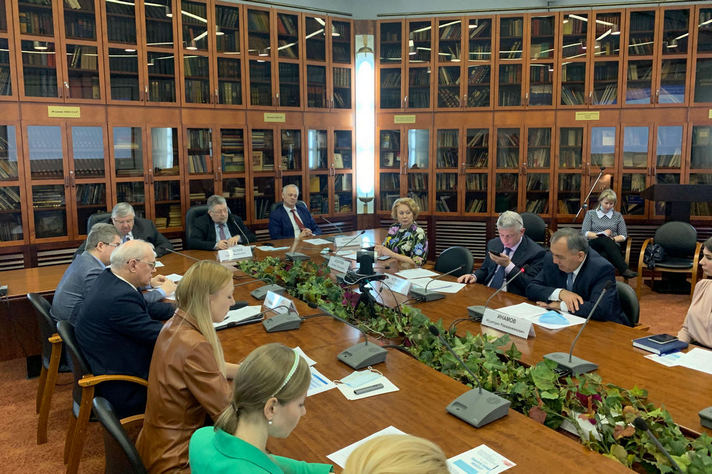Environmental experts discuss critical issues in the implementation of the Stockholm Convention on POPs
April 08, 2021

On April 6, 2021, a round table was held at the Chamber of Commerce and Industry of the Russian Federation “Fulfillment of the international obligations of the Russian Federation on the implementation of the provisions of the Stockholm Convention by 2025, in particular on the inventory and elimination of accumulated environmental damage of substances of the 1st hazard class, especially hazardous to human health, and namely, polychlorinated biphenyls (PCBs) contained in electrical equipment ”, organized by the Committee on Environmental Management and Ecology of the RF CCI with the support of the UNIDO Center for International Industrial Cooperation and the International Union of Non-Governmental Organizations“ Eurasian Peoples‘ Assembly ”.
Among the participants of the round table were the Secretary General of the Eurasian Peoples‘ Assembly, representatives of the Chamber of Commerce and Industry of the Russian Federation, the Civic Chamber of the Russian Federation, representatives of ANO „Ravnopravie“, the Ministry of Natural Resources and Environment of the Russian Federation, the Ministry of Energy of the Russian Federation, the UNIDO Center in the Russian Federation and others.
The meeting was opened by the Chairman of the RF CCI Committee on Nature Management and Ecology, Honored Ecologist of the Russian Federation, Sergey Alekseev, who was also the moderator of the event. Albina Dudareva, First Deputy Chairman of the Commission on Ecology and Environmental Protection of the Civic Chamber of the Russian Federation and Secretary General of the Eurasian Peoples‘ Assembly, Andery Belyaninov made a welcoming speech to the participants of the event. Ms. Dudareva in her speech emphasized the importance of the current event and noted that the policy of environmental openness can take the problem of PCB regulation to a completely new level.
UNIDO’s expert on risk assessment, Daria Razorenova, made a presentation on the toxic effects that PCBs impact on our body, stressing that they are superecotoxicants that can have a detrimental and depressing effect on the organisms of all living things. Representative of the Ministry of Natural Resources and Environment of the Russian Federation, Nuritdin Inamov in his report spoke about the work of the Ministry in the framework of fulfilling the international obligations of the Russian Federation on the implementation of the Stockholm Convention on POPs. Mr. Inamov emphasized that the UNIDO-GEF project on the safe management of PCBs remains one of the most full-scale and large projects in the Russian Federation, which pays attention to such an important issue as the disposal of PCBs. The chairman of the board of ANO „Ravnopravie“, Natalia Sokolova, spoke about the peculiarities of state regulation of the handling of extremely hazardous waste and the operation of objects of negative impact on the environment, which are generators of PCB-containing waste. Ms. Sokolova emphasized the need for enterprises to engage in instrumental inventory of oil-filled equipment, as prescribed by the Stockholm Convention on POPs. Ekaterina Demicheva, Development Director of JSC Rusatom Greenway, Member of the Intersessional Working Group on PCB Inventory of the Secretariat of the Stockholm Convention on POPs, also made a presentation. In her speech, Ms. Demicheva emphasized the importance and necessity of making an inventory at the enterprises that own PCBs. The Secretariat of the Stockholm Convention emphasizes that by the end of 2024, all enterprises that have oil-filled equipment and oil switches on their balance sheet need to carry out an instrumental inventory and have a passport on the environmental safety of equipment. Alexey Lisitsyn, Head of the Department of Ecology, Labor Protection and Industrial Safety of JSC Russian Railways, told about the company’s experience in implementation of a project jointly with UNIDO to regulate PCB-containing equipment. He emphasized that for all the years of the project, the specialists of Russian Railways have gained tremendous experience and knowledge in the field of PCB regulation, and also drew attention to the fact that Russian Railways has already begun carrying out instrumental inventory within the framework of the project, and the company’s employees are planning to bring the matter to the end and fulfill the obligations of the Stockholm Convention completely. Sergey Korotkov, Director of the UNIDO Center in the Russian Federation, project manager for PCB regulation, told the audience in more detail about the UNIDO project, about the large-scale work carried out both in legislative and practical aspects. Mr. Korotkov highlighted that the UNIDO project has created laboratory facilities that will be able to assist in inventory and sampling in enterprises, as well as in obtaining environmental safety certificates. The final speaker of the round table was Stanislav Korolev, Deputy Chairman of the Committee on Nature Management and Ecology of the Chamber of Commerce and Industry of the Russian Federation. In his report, he spoke about the environmentally sound management and disposal of PCB-containing equipment in the CIS countries, paying particular attention to the global nature of the topic of fulfilling the obligations of the Stockholm Convention on POPs.
At the end of the event, a lively discussion was held with the participation of all speakers and those present. The main topic of discussion was the need to involve enterprises-owners of PCBs in solving global tasks to fulfill the obligations of the Stockholm Convention on POPs. Unfortunately, many commercial enterprises still do not realize the magnitude of this problem, do not bear responsibility, and are not ready to take concrete steps to fulfill their obligations to destroy PCB-containing equipment. All participants of the meeting expressed their hope that by joint efforts we will be able to eliminate the consequences of the use of PCBs in our country.

